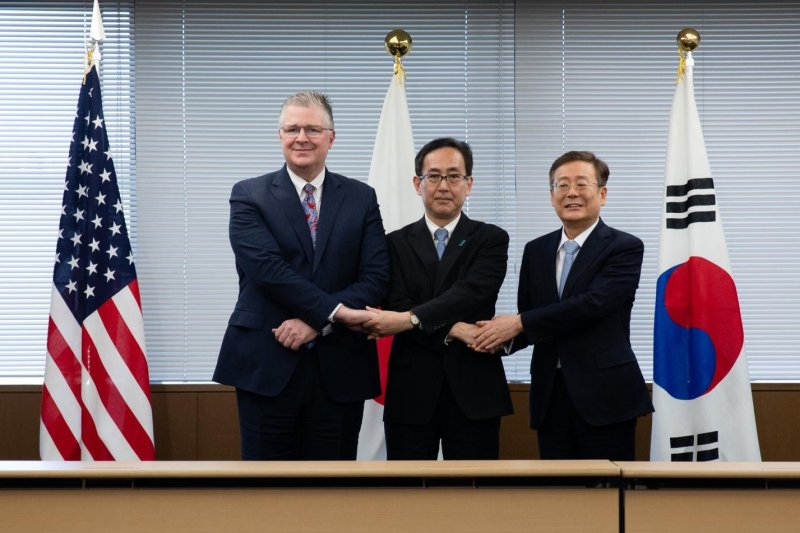Assistant Secretary of State for East Asian and Pacific Affairs Daniel Kritenbrink, Japan’s Director General Namazu Hiroyuki and Republic of Korea Vice Foreign Minister Cho Koo-rae meet Monday to discuss concerns over the “deepening military cooperation between the DPRK and Russia.” Photo courtesy of Bureau of East Asian and Pacific Affairs
Dec. 9 (UPI) — The United States, Japan and the Republic of Korea are expressing concerns over developments in the Democratic People’s Republic of Korea and the “deepening military cooperation between the DPRK and Russia,” the U.S. State Department said Monday.
Assistant Secretary of State for East Asian and Pacific Affairs Daniel Kritenbrink and Japan’s Director General Namazu Hiroyuki met Monday with ROK Vice Foreign Minister Cho Koo-rae as the three vowed to strengthen their cooperation.
“Important conversations today with Japan Director-General Namazu and Vice Foreign Minister Cho,” Kritenbrink wrote Monday in a post on X. “We discussed our nation’s close trilateral cooperation in addressing deeply concerning developments in the DPRK and the deepening cooperations between the DPRK and Russia.”
During their meeting, the three counterparts discussed the “deepening military cooperation between the DPRK and Russia, as well as developments in the DPRK’s unlawful weapons of mass destruction and ballistic missile programs,” which they called “deeply destabilizing” and a “grave threat to regional and global security.”
Monday’s meeting comes after Russian President Vladimir Putin revealed last month that Moscow had used a nuclear-capable weapon against Ukraine for the first time since its invasion nearly two years ago. Russia hit a Ukrainian aerospace plant with an experimental hypersonic missile just days after Ukraine fired U.S. long-range missiles after U.S. President Joe Biden gave Kyiv authorization to attack deeper into Russian territory.
In the last month, the South Korean government reported as many as 3,000 North Korean soldiers were sent to Russia to assist in the war with Ukraine. Since its invasion of Ukraine in February 2022, Russia has ignored sanctions placed on North Korea and has accepted North Korean-made weapons to use in the war.
Ukrainian President Volodymyr Zelensky warned North Korea could deploy up to 100,000 troops to help Russia in its war against Kyiv.
“Now, Russian President Vladimir Putin has brought 11,000 North Korean troops to Ukraine’s borders, that contingent may grow to 100,000,” Zelensky said last month.
North Korean leader Kim Jong Un also has made his support for Russia clear.
“The DPRK government, army and people will invariably support the policy of the Russian Federation to defend its sovereignty and territorial integrity from the imperialists’ moves for hegemony,” Kim said, according to the North Korean state news network KCNA.
Kim signed a mutual defense agreement with Russia in June and has pledged to expand ties with Russia in all areas.
Next year, the Russian defense minister is reportedly inviting a “DPRK military unit” to join Russia’s annual parade on Moscow’s Red Square to mark the 80th anniversary of the Soviet Union’s victory over Nazi Germany in World War II.
As Russia has reportedly accepted weapons from North Korea, it has warned South Korea against supplying weapons to Ukraine, saying it would “fully destroy relations” between the two countries. Seoul has provided humanitarian and financial aid to Ukraine, but it has refrained from supplying weapons for its defense.
In addition to weapons of mass destruction, the United States, Japan and the Republic of Korea also discussed cooperation Monday to disrupt the DPRK’s “malicious cyber activities, including illicit cyber-enabled revenue generation, and followed up on the outcomes of the Trilateral Diplomatic Working Group on DPRK Cyber Threats.”
North Korea and Russia have been working toward a deeper economic and scientific cooperation, as Kim said relations between the two countries had reached a “new strategic level.”
Monday’s meeting also solidified the U.S., Japanese and ROK commitment to work for the safe return of abductees, detainees and unrepatriated POWs, while “promoting respect for human rights in the DPRK.”
The three underscored the “importance of maintaining close trilateral cooperation in addressing these threats and promoting peace and stability on the Korean Peninsula and restarting dialogue and diplomacy with the DPRK.”
